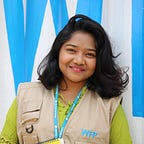‘I am grateful for everything I have now’
Stories of hope, happiness and gratitude from the Rohingya refugee camps in Cox’s Bazar, Bangladesh
I joined the World Food Programme communications team in May 2018 to work on the Rohingya refugee response.
Though we often talk about the numbers, this year I have realised that everyone who I have met has a unique story to tell. I have met many refugees whose stories are more than the gruesome descriptions of violence and struggle we are used to hearing about. In person, all Rohingya refugees are symbols of hope and inspiration. Here are a few of the stories that have stuck with me.
‘The food has saved our lives’ — Nur Ayesha
The monsoon season in Bangladesh is scorching hot and humid. June is one of the most unbearable months which is also when Ramadan falls. Imagine how difficult it can be fasting in extreme temperatures. I spoke with Nur Ayesha who came to one of our food distribution points to receive her food. She explained that she was fasting and took me to her home which is set at the edge of a slope. She lives there with her husband and 7 children. While talking to her, I was mesmerized to hear how she appreciates the small things in her life.
“At the beginning, we struggled a lot,” she recalled. “Eventually we started to receive rice, pulses and oil. It’s very hot and we feel distressed. However, compared to before, our situation is much better and more peaceful. Allah has blessed us with lives. We have a roof over our heads, we safely arrived here, we have gotten food to eat, we are and forever will be grateful for this.”
Despite her living conditions, and fears about the difficulties a monsoon would create, Nur Ayesha is just happy to be alive and living with her husband and 7 children.
‘This card gives me more choices’ — Fatema
Fatema lost her son and her daughter in law while fleeing from Myanmar. Now she is living in the Cox’s Bazar refugee camps with her husband Firaj and two grandchildren Anwar Sadek and Kamal Sadek.
When I met her, it was the day she was receiving her WFP Assistance Card. These cards are being distributed to all refugees in the camps and will give them access to a greater variety of foods. With the cards, they can choose from 18 different items, including fresh produce, rather than the usual rice, daal, and oil.
“I will get eggs, dry fish, sugar, salt, onions, garlics, chillies and fresh vegetables [with the card],” Fatema told me.
“I am looking forward to receiving food through this card, and I am very excited that after many months we will get different things to eat.”
Once she finished her shopping, the happiness was visible on her face.
When I come across content souls, I do not have to ask them to smile for a photo. The twinkle in their eyes is clear and their grin lights up their entire face. Similarly, when someone is in pain, no matter how much we ask them to smile for the camera, they cannot fake it.
‘We can not be happy when we are unable to eat’ — Islam and his wife Senoara
Prior to the monsoon season in 2018, hundreds of families were moved to new and safer areas as they were living in areas prone to flooding and landslides. Islam and his family were among the very first to be moved.
“I feel much safer. Here we are living on flat land,” Islam told me at that time.
“Before my house was on top of a hill in the camp. It was very difficult to climb up there when it was raining, as it would get slippery. Then also, we had risk of landslides and our house got damaged and other stuff washed away. Here there’s no risk of landslides.”
After speaking to them for a while we began to take photos, thinking that they were happy in their new shelter. But then Islam’s wife Senoara shared some of their troubles.
“We are less tense now but my husband got hurt while moving here,” Senoara said.
“We have the WFP rations at home, but we don’t have any stove yet. I have to think what I am going to eat now, how my children will drink water, how I can get medical facilities here, there’s nothing to be very happy about.”
This story has a happy ending though, I visited their camp a few days later and Senoara ran to me smiling.
“We made a clay stove to cook,” she exclaimed with joy.
“Now we do not have to worry about our food. Yesterday WFP came with food trucks to distribute food inside our camp so we did not have to go far and we could get our rations from here.”
I went inside her shelter to see her stove and she smiled broadly at the camera, joy radiating from her eyes.
Each individual in these refugee camps is unique and it is difficult to share every story when there are almost a million of refugees living in Cox’s Bazar. But they have some common elements in their stories, small changes in their lives can be a source of great joy and contentment. People know the worth of their lives and they truly appreciate it. Maybe this is what encourages them to live, love and be hopeful for a better future.
WFP is providing life-saving assistance to more than 860,000 Rohingya refugees living in Cox’s Bazar, Bangladesh.
You can also support them, learn how
